Movie Review – Sanctum
If a film could be seen to have potential, Sanctum had it in spades. It’s only a shame it never lived up that potential, otherwise it might have been a passably entertaining film. Script issues and woeful acting performances from a cast who should know better cannot lift the tension beyond mediocre. The direction lacks verve (apparently this showed in 3D in cinemas, although I cannot for the life of me appreciate why that was a big draw, considering most of the film is an incomprehensible maze of underwater canyons, chasms and treacherous, water-filled death-traps) and the requisite death scenes of the main cast thud with lifeless efficiency to their natural conclusion. Sanctum is a wet, drenched-with-dull snore-fest, lacking even the most modest thrills or the most basic sense of tension.
– Summary –
Director : Alister Grierson
Year Of Release : 2011
Principal Cast : Richard Roxburgh, Ioan Gruffudd, Rhys Wakefield, Alice Parkinson, Daniel Wyllie, Christopher Baker, Allison Cratchley.
Approx Running Time : 109 Minutes
Synopsis: A group of cave explorers are trapped within an enormous system of caverns after a tropical storm floods their exit – and the water is rising rapidly. With no option but to follow the water to its natural exit, the group must battle not only fear but fatigue, lack of oxygen, and the tick-tock of time running out.
What we think : If a film could be seen to have potential, Sanctum had it in spades. It’s only a shame it never lived up that potential, otherwise it might have been a passably entertaining film. Script issues and woeful acting performances from a cast who should know better cannot lift the tension beyond mediocre. The direction lacks verve (apparently this showed in 3D in cinemas, although I cannot for the life of me appreciate why that was a big draw, considering most of the film is an incomprehensible maze of underwater canyons, chasms and treacherous, water-filled death-traps) and the requisite death scenes of the main cast thud with lifeless efficiency to their natural conclusion. Sanctum is a wet, drenched-with-dull snore-fest, lacking even the most modest thrills or the most basic sense of tension.
**********************
If you could name three of the scariest places known to humanity, the places you’d hate to be trapped with no hope of rescue, one of them would be Michael Bay’s imagination. Another would be in an underground cave system, where certain death surrounds you in the form of rapidly rising water and a distinct dwindling of supplies. Sanctum, while maybe not inside the mind of Michael Bay, is a film which hopes to instill in most normal folks the fear – the deathly fear – of venturing underground where darkness descends as soon as the light goes out, where water becomes a torrent, and where your only hope of rescue comes in the form of Moulin Rouge’s Duke. While the 3D marketing pitch and the lure of another underground terror ride might sway folks to go see this film, one should pay heed to your reservations when Richard Roxburgh is your tour guide – this is the dude who wanted to pork, and then kill, Satine, after all – and simply refuse to do so. Sanctum is a film with an inherent potential to scare and terrify, regardless of the cast or the obviously lackluster scripting, and yet in every sense it fails to fulfill its obligation to do just that. The setting is simple, the premise is ideal, and the added bonus of high definition photography and state-of-the-art effects merely seems like cream on the cake to a delirious thrill-seeker – but there’s a mediocrity to Sanctum that many won’t see coming.
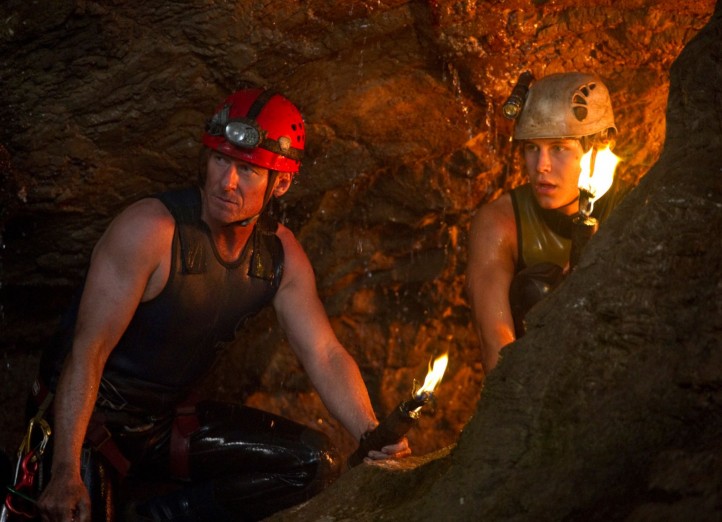
Frank McGuire (Richard Roxburgh) leads a group of adventurers in a cave diving expedition in the Eas’Ala caves in Papua New Guinea, in order to explore the uncharted regions of one of the world largest underground cavern systems. The group is funded by multimillionaire Carl Hurley (Ioan Gruffudd), whose girlfriend Vic (Alice Parkinson) is a mountaineering expert who decides to join him in exploring the underground system. Franks son, Josh (former Home And Away actor Rhys Wakefield) isn’t happy about being forced to join the expedition, with a large rebellious streak and a somewhat antagonistic relationship with his father. Franks team includes George (Daniel Wyllie), JD (Christopher Baker) and Judes (Allison Cratchley) – the latter of whom is killed while exploring the caverns when her airline disconnects and she drowns. When a tropical storm bears down on the cave, and floods the exit, the group must keep moving forward towards the only other way out – through the caves and out into the ocean, miles away from their location and at the end of a dangerous underwater catacomb.
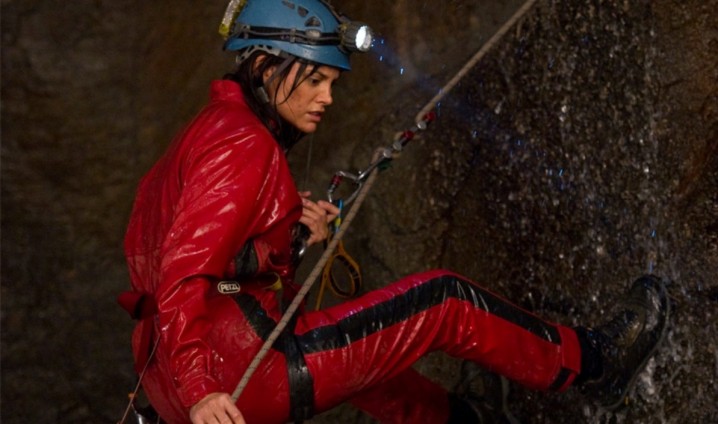
Inspired by James Cameron’s diving cohort Andrew Wight’s near-death experience cave-diving in a similar cave system on Australia’s Nullarbor Plain, Sanctum is also executive produced by Cameron himself, and filmed using the same digital 3D camera’s developed for Avatar. So the draw is this – Cameron, Avatar, 3D and underground thrills. While the film’s success (or lack thereof) probably had little to do with either Cameron’s tentpole name, or the “using the technology of Avatar” brand, Sanctum is beset with too many critical problems to be overcome before any sense of enjoyment might be derived from it. So don’t be sucked in by Cameron’s attachment to this project; this film is neither exciting or a “game changer”, for much the same reasons Avatar’s re-watch value is largely diminished by a deficit of story (and characters) varnishing some admittedly amazing visual effects. Effects do not a great film make – Sanctum features a minor amount of visual effects, instead going the “real world” route of actually filming a lot of their underwater sequences in real caves beneath the surface, and for this I give the film a hearty pat on the back. Too often these days filmmakers might take the easy option of doing much of this kind of film digitally, and I think any saving grace of Sanctum’s nadir-carving ineptitude can be laid squarely on this decision.
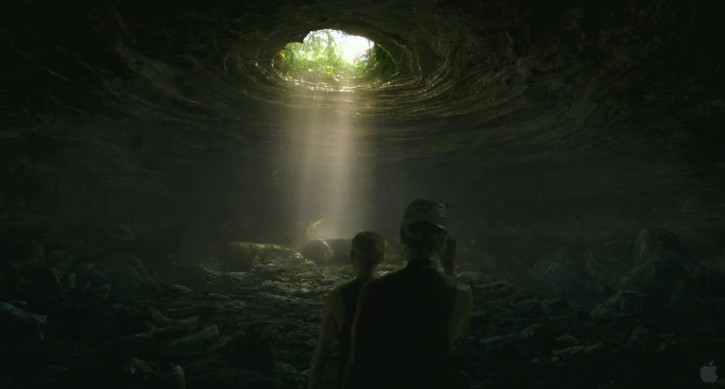
The problems with Sanctum are two-fold. First, the screenplay, written by John Garvin and Andrew Wight, is terribly derivative, lacking any real sense of emotional jeopardy, even if the physical jeopardy is totally real. Second – and perhaps key – is the decidedly average performances by the eclectic cast, most of whom struggle to deliver some of the clunker lines this script throws up. The central arc of the film involves Frank and Josh’s antagonistic relationship, with Josh despising his father’s reluctance to actually be a father to him, while Frank is trying to desperately instill some kind of responsibility through a constant berating (I’m not quite sure how that’s supposed to work, actually); neither see eye to eye, although you just know that by the end of this film, some kind of reconciliation or understanding will be achieved. Garvin’s dialogue is lamentably cliched and instructional – he’s using the dialogue purely to advance the character motivations – which isn’t a problem normally except that some sort of subtle, character-development instilled storytelling needs to accompany this. There’s little subtlety here folks; Frank’s a surly, salty master diver, while Josh is a scowling, self-interested youth, and the Carl is the typical all-money no-care millionaire businessman type, only out for fame and glory. The rest of the cast are fodder for the perils of caving, and although the filmmakers try and ensure some unique death scenes are included, the lack of emotional investment limits the impact these have.
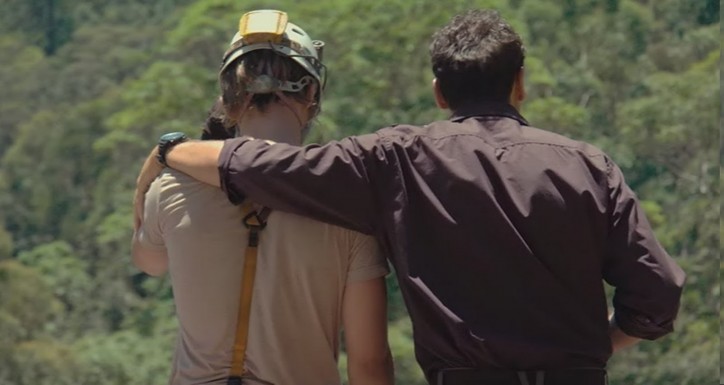
It doesn’t help the film that almost the entire movie is either miscast or hopelessly inept at storytelling. Richard Roxburgh and Ioan Gruffudd should have known better than what they serve up here, although it’s probably not entirely their fault. Roxburgh uses some weird gravelly accent, almost sounding like Christian Bale’s Batman as he sweeps through the film; he’s about as convincing as you could hope for in a film like this, and at times he does feel like he’s been doing this forever. Gruffudd, who did okay as one quarter of the Fantastic Four, is the token “imbecile” in the film, deciding that because he’s got money he can just do whatever he likes. He’s the one most likely to go all “crazy” at the end (he does, spoiler!) and you can see it coming a mile away. Poor Rhys Wakefield is truly terrible as Josh, his dialogue (and delivery of it) just sounding inept and unrealistic. He looks like he’s acting, and it undoes the film like crazy. As a former Aussie soap star (are soap actors really ever “stars”?) he’s unconvincing, wooden and marginally better than the rock chasms he must swim through. Alice Parkinson, as the kinda-carefree, kinda-uptight Victoria, also can’t act to save herself here, while her accent jars against the more jingoistic Aussie flavorings sprinkled throughout the remainder of the cast. Daniel Wyllie, as the ill-fated George, is as believable as any in this film, although his role is overly simplistic – nearly tokenistic – he’s great to watch in any case.
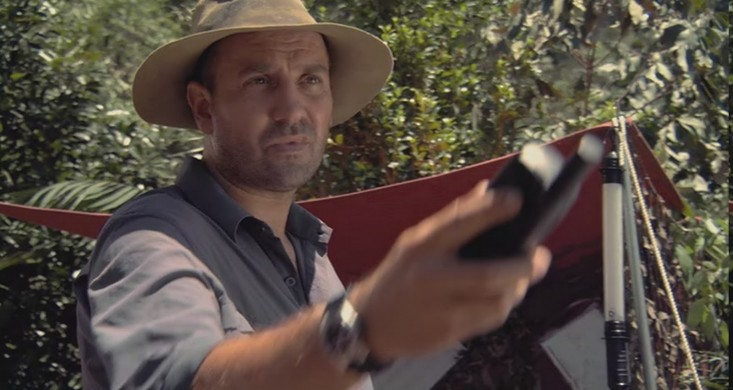
With a derivative and inexplicably numbing screenplay such as the one on offer here, you’d think that director Alister Grierson would keep the action moving to overcome narrative deficiencies. Unfortunately, Grierson’s lack of inventive film-making style is indicative of another of the problems facing Sanctum. The film has pacing issues, spends a great deal of time with establishing shots, and can’t quite generate excitement through much of the potentially riveting moments the film contains. There’s glimpses of genuine excitement – a hanging-by-your-hair moment in particular is well done, although fumbles at the climax – but the inevitable moments we expect throughout, like the son and the father bonding through adversity, or the token female doing something stupid to get herself killed, all play out like the script is written by a computer. Join the dots, you might say. Grierson’s CV isn’t extensive – he directed the Aussie film Kokoda, retelling the events of Australian soldiers battling on New Guinea’s infamous Kokoda Track, which wasn’t too bad (it wasn’t great, but was definitely watchable) – and it shows: Sanctum lacks a real pulse, a genuine sense of scope and scale, even though it might look pretty through the 3D lens.
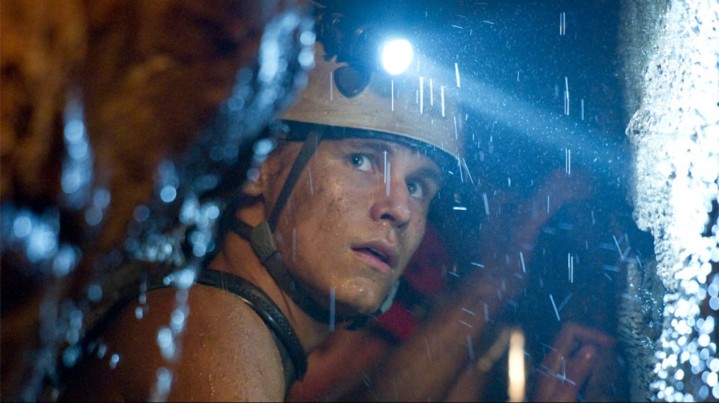
Sanctum has – rather, had – potential to be great. The set up and the premise are truly terrifying for most, but Grierson fumbles the ball with bad casting and a dire script. Perhaps had there been less technical focus and more character focus, the film’s tragic narrative might have had more punch. As its stands, Sanctum is an underwhelming, routine actioner with little re-watch value aside from seeing Roxburgh chew the scenery, and the scenery itself, most of which is cavernous and watery death. With so little going for it, it’s a wonder the film made back it’s original budget. Such a shame, because it could have been awesome.


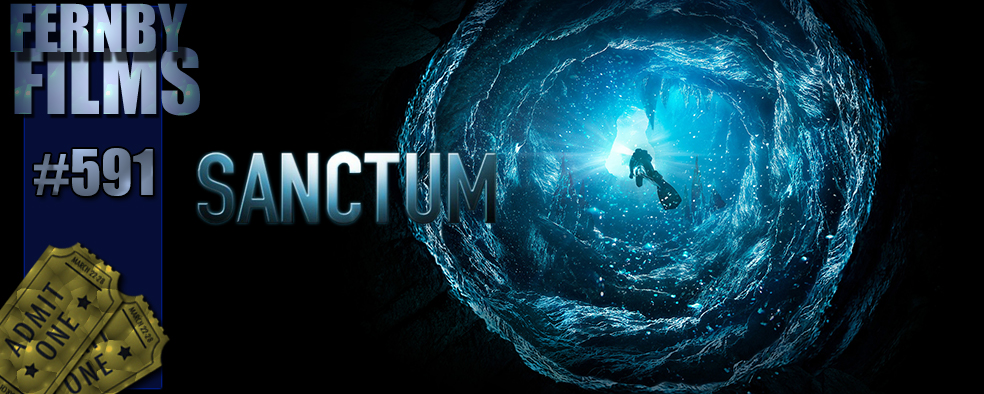
 Film Review: Sanctum
Film Review: Sanctum